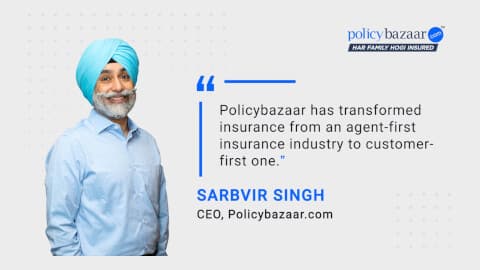1
Feeling Inadequately Insured? 3 Ways To Extend Your Health Insurance CoverDecoding Insurance
NiveshKarBefikar with Sarbvir Singh: Health Insurance In Times Of Covid-19
There is no doubt that Covid-19 has accelerated awareness around health insurance in India. In fact, recent trends suggest demand for health insurance has risen significantly in the last three months not just in metro cities but also in tier-2 and tier-3 cities. More and more people are realizing the importance of having a health insurance cover as healthcare costs have also been on the rise in recent times.
In continuation of its consumer awareness initiatives, Policybazaar.com organized a health insurance special webinar, under its Nivesh Kar Befikar series. The webinar was hosted by Vivek Law, founder, and editor-in-chief of The MoneyMile, who spoke to Sarbvir Singh, CEO, Policybazaar on the importance of Health Insurance in the times of Covid-19.
Here are the edited excerpts from the Q&A session:
Q. As cases are increasing, how is health insurance as a sector coping with high claims?
The health insurance sector is coping quite well so far. The regulator has played a major role in making sure that the industry is prepared, setting the guidelines and expectations very clear upfront. Insurers have also stepped up. Many of them have voluntarily taken the step of covering consumables which can be a large part of the stock. The industry is doing cashless claims. Overall, the industry is well prepared both from the regulatory and industry perspective and handling the situation quite admirably so far.
Q. Does it indicate people are more aware of Health insurance? Do you think Covid-19 is changing the attitude towards health insurance?
Covid-19 has been a huge shock to society at large. In India, more and more people have realized that insuring themselves is important. In many cases, claims have been much higher, which is a major blow to financial health. Covid-19 is a poster child for being an unforeseen event which has led to awareness and demand for health insurance.
Q. Does a regular health plan cover Covid-19 treatment?
— From Amir Khan, Jignesh Panchal, Ravi Vallabhaneni and Rajiv Grover
All regular health plans cover hospitalization and any Covid-19 related hospitalization is covered by all health insurance plans. So, anybody who has a health insurance policy has Covid-19 coverage. There are some insurers that cover all consumables that are used while in some cases, they cover a part of the consumables and some don't cover. That depends on the individual policy you have.
Q. What are some of the good health plans for senior citizens who are 60+ years old with zero co-payment.
— From Jagmohan and Jaishree
There are several options. Senior citizen plans tend to be a little bit more expensive. They could look at Max Bupa Health Companion, HDFC Ergo Health Optima Restore, and HDFC Ergo Health Suraksha. All these three plans don't have co-payments. Other plans like Star Red Carpet and Religare have co-payment but the above three will be good options.
People above the age of 60 years can get health insurance. They have to be careful and need to declare what medical conditions they have and what medications they are taking. So, that if a claim arises, there isn't any confusion about it. Each of these policies has a waiting period for Pre Existing Diseases (PEDs). Many plans offer coverage without a physical medical. So, you can get these policies through telemedical in which a doctor will speak to you and ask you about your medical conditions.
((calculator))
Q. Can I convert my existing health insurance policy to a Rs 1 crore policy?
— From Saurabh Saxena
Max Bupa and Religare offer Rs 1 crore sum insured and have options for portability. Both work slightly differently. Religare is a full Rs 1 crore cover. So, if you have Rs 5 lacs sum insured, then you will be able to carry all your benefits with you. So, if you have already served your waiting period, it will be waived for Religare policy. In the case of Max Bupa, the continuity will be only up to Rs 5 lacs because Max Bupa has a standard Rs 5 lacs policy and Rs 95 lacs top-up. So, you will get the waiver up to Rs 5 lacs and coverage will be there for the entire Rs 1 crore sum insured.
[ Also read | Health Care Costs For Covid-19 And The Right Insurance Cover: The Policybazaar Show]
Q. How to ensure that my claim is not rejected?
— From Eldhose Issac
Make sure you make all declarations upfront when you buy a policy. There is a waiting period but most conditions are covered eventually. The biggest problem with claims happens that you don't declare a PED. I would urge everybody to be fully aware of the conditions of your particular policy because that can lead to misunderstanding over how much money you will get. For instance, if there is a room rent capping and you opt for a private room instead of a shared room, then not only will the room rent differential have to be paid by you, the services also get marked up.
Q. Can we buy a policy which covers me and my family too?
— From Rahul Sen
Yes, these are called family floaters which are very common where you can cover yourself, kids, and in some cases your parents. Although, it is better for you to separate your parents and family as parents may be senior citizens and they may have different restrictions and requirements. Buying a family floater policy is a good option. The main advantage is that the entire sum insured can be used by any of the family members. So, its like a pool which can be divided between the family members. Hence, you don't need to buy individually.
Q. Can a family floater policy also be ported to another insurer?
— From Akshat Kansal
Yes, it can be ported. The rules are the same if you have served your waiting period in your existing policy, you don't need to serve those waiting periods again when you port to a new policy and the sum insured that you have gets carried over to the new one.
Q. Is there a major limitation of super top-up plans apart from deductible limits?
— From Eldhose Issac
In general, super top-up plans don't have any other limitations. They provide additional cover over and above the basic hospitalization policy. In general, super top-ups are a good way to increase coverage and to provide protection.
Q. What is the difference between HDFC Life and HDFC Ergo?
— From Hitesh Balwani
HDFC Life and HDFC Ergo both are owned by the HDFC Group. HDFC Life is a life insurance company. Life insurance companies also offer health benefits like critical illness riders. Life insurers are allowed to offer health plans but they are not indemnity plans. They are fixed benefit plans which means that they will give you a certain amount of money if an illness is triggered. Indemnity plans cover the cost of hospitalization which is offered by health and general insurance companies. HDFC Ergo is a general insurance company and has a health insurance arm as well.
Q. How much minimum insurance for a family of four members should be bought?
— From Saroja Kumar Sahoo
It depends on where you live. If you live in a metro city, hospital treatments tend to be more expensive. A good rule of thumb is that you should buy Rs 10 lacs per adult in the family. What is interesting these days is that if you look at Rs 20 lacs cover, you will find that the cost of Rs 1 crore cover is the same. So, it makes absolute sense to go for a Rs 1 crore cover depending on your budget. If you can, this is a good time to buy a Rs 1 crore cover.
Q. Does health insurance cover life cover as well?
— From Kuldip Singh
No, it doesn’t cover. You can buy a life insurance cover through a life insurance company and get critical illness health riders on it.
Q. Does health insurance cover an accident expense?
— From Rahul Sen
Accidents are covered from day 1 in all health insurance policies.
Q. Nowadays, term insurance is becoming very popular. What is the difference between term insurance and a normal health insurance plan? Which is better?
— From Pawan Gangadhar
Term insurance essentially covers the mortality risk. It is essentially more a loss of income product. The idea is if your family is dependent upon your income for their well being and financial needs if the breadwinner is not there, your family needs financial support. Term insurance should be taken as a function of your income and household expenses. We typically suggest 10-20 times your annual income for you to be covered so that your family is secure. On the other hand, health insurance covers any kind of disease or accident. These are two different covers. What we suggest to people is that you should have both.
Q. I have purchased a health insurance plan from Policybazaar from Max of Rs 1 crore. Will it cover all illnesses?
— From Tousif Shaikh
If it's Max Life, it might have a critical illness rider in which policy will cover only those critical illnesses specified in the policy. If he has a Rs 1 crore health insurance cover from Max Bupa, then all illnesses will be covered.
Q. Can you please elaborate on Arogya Sanjeevani Policy? Is it a good policy compared to market-leading policies?
— From KVN Sai Krishna
It is a policy introduced by the regulator. The good part about this policy is that it's a standard policy. So, everything has been clearly laid down by the regulator and it is available. The only difference across companies is the price at which it is offered. In terms of comparison, the main point which you should consider is that Arogya Sanjeevani has a co-payment. Whereas most of the market-leading plans don't have a co-payment. So, that is the choice that you have to make. Also, initially, there was a Rs 5 lacs limit on the sum insured which has now been relaxed. Now, insurance companies can offer as much sum insured as they want. You will find that Arogya Sanjeevani is cheaper to buy as compared to other plans in the market but if there is any illness, you will have to shell out money from your pocket.
[ Also read | What Do You Look For In A Health Insurance? The Policybazaar Show]
Q. Is there any policy that covers cancer?
— From Rahul Sen
Yes, as long as it's not a PED, many plans cover cancer. That's one of the cases where a Rs 1 crore health insurance policy can come handy because the amount of money spent on treating cancer can be really huge. Cancer is also covered as critical illness riders by life insurance companies. If you were to get cancer, you get that money upfront from them. So, cancer is covered in both cases.
Q. Should we take critical illness riders from a life insurance policy or through a health insurance policy?
The best way to think about it is that if you have a health insurance policy of higher sum insured health like Rs 30 lacs or Rs 1 crore. Then, perhaps having a critical illness rider is not that important because the health insurance policy will cover these critical illnesses as well. However, if you have a health insurance policy with a lower sum insured, let's say Rs 2 lacs or Rs 5 lacs, it makes sense for you to have a critical illness rider because when you have a critical illness whose expense will be more than Rs 5 lacs, your policy will pay off.
Q. While there are a host of options available for inpatient department product (IPD) benefits, there are hardly any products for outpatient department (OPD) benefits. The limited options for OPD benefits cover are expensive. Any thoughts around this?
— From Aman Dhall
That's correct. OPD in general is harder in the Indian context. There are some insurance policies. This will be an area of innovation in the next coming year. You will find some better policies in this area. But at this point, I agree with you that while there are some OPD covers available in the market, they tend to be expensive.
Q. Does health insurance provides coverage for consumable items during hospitalization? You made the point earlier on consumables if you can elaborate on that.
— From Amit Sharma
In general, consumables are not covered. Whenever you make a health insurance claim, there will be small deductions. They typically are for consumables like gloves etc. Since health care workers have to wear protective equipment all the time, it is a significant cost. Some of the companies are paying the full amount for the consumables, some pay up to a limit like up to Rs 2000 or Rs 3000 per day. In rare cases, they may not pay. The best way to think about this is that insurance companies are not obliged to pay for them. But given the severity, they are paying.
Q. I am 60 years old and my wife is 65 years old. What are our options for health insurance?
— From Yashpal Mehta
We had discussed a few policies which you can get without a co-payment like Max Bupa Health Companion, HDFC Ergo Health Optima Restore, and HDFC Health Suraksha. Star has a popular Red Carpet health insurance plan. Religare has a plan as well for senior citizens. Both these plans have a co-payment. The factors that you have to consider when buying a health insurance cover are what are your existing medical conditions, the price you have to consider without co-payment, and what is the price with co-payment. With co-payment, the health insurance plan will be cheaper than without co-payment. So, depending on your budget and needs, you may make the decision.
Q. Is a policy issued by a bank portable?
— From Navdeep Patel
I think the answer depends on what kind of policy. Many times banks sell group policies. These are not retail policies and are meant only for the customers for that particular bank. Sometimes, these can be a little cheaper than normal retail policies. So, people get attracted to them. But the problem with them is that they can't always be ported to a retail insurance policy. Also, their prices can change every year. In a retail environment, regulators have certain rules and restrictions on how prices change. So, if it's a group policy, portability will be difficult but if it's a normal retail policy, portability will be allowed.
Q. What should be the considerations for choosing a plan during Covid-19?
— From Prem
Considerations should be exactly the same as they would be without Covid-19. You should look at the maximum sum insured that your budget allows you, room rent capping, waiting period, sub-limits. At this point, the same criteria would apply in Covid-19 environment.
Q. What about special plans like Diabetes specific plans? Can they be processed for portability? Right now, I have a Rs 5 lacs health insurance cover and I want to port it into a Rs 1 crore.
— From Neena Biswal
Yes, if you have diabetes, depending on the plan that you have bought, you can port your insurance policy. The waiting period will get carried with you. So, if you have served some part of it, you don't have to start again. There are two options right now. Max Bupa has a Rs 5 lacs sum insured and a Rs 95 lacs super top up and Religare Care Advantage has a health insurance plan of Rs 1 crore sum insured. In your case, what you are looking for is porting to the Religare Care Advantage.
Q. Please explain in detail some of the best ways to reduce hospital bills so that insurers pay less amount and loading is minimal.
— From Vishal Kanhiyalal Navlani
This is a bit of a myth carried over from motor insurance that if you make a claim in health insurance, next year your renewal premium goes up. Actually, this is not allowed explicitly by law. There is no individual loading that can be done. So, health insurers are allowed to look at their book over a three-five years period and they do change their prices. But for an individual, there is absolutely no impact whether you make a claim in a particular year or you don't. The only impact is that the 10-20% no claim bonus you used to get from the insurance company, gets added to your sum insured in most cases and you won't get it. There are no real economies you need to exercise should you, unfortunately, need to be in a hospital.
Q. After taking a new policy at this time, after how many days will Covid-19 be covered?
— From Naresh
There are policies like Edelweiss covering Covid-19 from day 1. Star covers Covid-19 from the 15th day. In general, Covid-19 will be covered after 30 days in most of the health insurance policies.
Q. If you buy a new specific Covid-19 health insurance policy, and then suppose, you get admitted for Covid-19, during the treatment due to other comorbid conditions, another treatment is required, then in such cases, will your policy cover the entire treatment?
— From Nilesh
As long as the doctor makes a determination, whatever your co-morbidities have been triggered by Covid-19, then the entire matter would be treated as Covid-19 and it would get reimbursed. Of course, if those two aren't related, then you would not get covered with your Covid-19 specific policy. In a general health insurance policy, Covid-19 and any other illness will be covered depending on exclusions.
Q. What's a good health insurance policy for a 21-years-old?
— From Vivek
It's good that people have started thinking about health insurance at an early age. At 21 years of age, you will find that almost all policies will be easy for you to get. If your budget allows, go for a Rs 1 crore health insurance coverage so that you have a policy that has a large sum insured and your waiting period will be passed soon. You have a choice of all leading insurers and good policies at this age.
Q. We see all health insurance companies are providing health insurance at different premium rates. Sometimes, it is seen that one company provides cover for Rs 15-25 lacs at a particular premium when another company is providing a cover of the huge sum insured at the same premium of Rs 15-25 lacs cover provided by that company.
— From Saurabh Kumar
I can understand your question from a consumer perspective. There are different rates across companies. I listed out the key criteria for insurers to decide premium rates. One is room rent- the more expensive your policy, you will have a higher category of rooms. Second is sub-limits- cheaper policies will have sub-limits, more expensive policies will not have sub-limits. The third area which you should always look at is the claims ratio of the insurer. Some insurers tend to be relatively generous in paying claims and sometimes in those cases, their policies tend to be more expensive. Whereas some insurers tend to be very strict in terms of paying claims and their policies would be cheaper. Lastly, the premium is based on the waiting period. If the waiting period for pre-existing diseases is lower, then the policies tend to be more expensive and if the waiting periods are higher, then the policies tend to be cheaper. A combination of these factors decides the cost of the policy. I would suggest you look at the insurance policy in detail and then decide depending on your situation.
Q. I found that there’s a new policy provided by Star called Young Star. Can you explain it in brief as I think it's not mentioned on Policybazaar?
— From Swapnil Rout
It's now on our portal and we have been selling it for a few weeks. It is a good insurance policy and is meant for younger people. It has only a one year waiting period for pre-existing diseases. If you are less than 40 years old, this should be a policy you should consider.
Q. Should one go for a Super top-up or port to a Rs 1 crore health cover when trying to raise the sum insured?
— From Pankaj Gulati
I think both are good options. A super top-up might prove to be more economical from a cost perspective. The advantage of Rs 1 crore health insurance cover would be all your PEDs and waiting period will be covered all the way up to Rs 1 crore whereas, in the super top, they would be covered only up to the base sum insured. So, its something you can look at depending on your situation. Both are relatively good ways because even if you get a claim with a super top-up, the entire claim would get covered between the two policies. In the case of Rs 1 crore, one policy would be covered.
Q. Do you see daily cash benefit health insurance more beneficial than conventional health insurance that typically doesn't cover consumables? Does daily cash be chosen as an add on in traditional insurance?
— From KVN Sai Krishna
As I explained, most of the leading insurers are covering consumables. So, that is not particularly the difference between the two policies, particularly at this point. I think having an indemnity policy that covers the cost of hospitalization is a better way to go than having a cash benefit policy but depending on the situation. For instance, if you have existing health insurance coverage and you want extra coverage for Covid-19, then buying a fixed benefit policy that pays cash per day could be a good way. So, there are some advantages to getting cash also but in general, it is better to go for a full indemnity policy and only use cash benefit as a top-up if you already have an existing policy.
For our webinars, visit: https://www.policybazaar.com/pblife/decoding_insurance/webinars
(Article edited by: Sunny Lamba)













